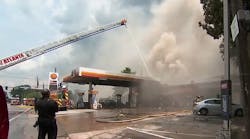WASHINGTON, D.C. – While sending trained EMS personnel into a patient’s home to do basic preventative care may seem like a perfect fit, there are still many challenges that agencies need to overcome.
In the past few weeks, Ohio and Virginia have come out with statements about the issue, and other organizations are weighing in as well, Dr. Lori Moore-Merrell told a group attending a session during the Congressional Fire Service Institute's meetings .
“Ohio law allows EMS providers to perform only emergency medical services. EMS providers should be aware that immunity from civil liability applies only if they are administering ‘emergency’ medical services,” she said.
And in Virginia, EMS agencies interested in providing community paramedicine may be required to obtained licenses by the state’s health office.
Meanwhile, a nurses’ association said it feels they may need to supervise the medics, questioning their abilities, she said, adding that some agencies are getting very territorial.
While the Affordable Care Act doesn’t mention EMS, Moore-Merrell added: “It sets up opportunities for EMS though.”
The IAFF will vote on a resolution at its annual convention in July whether or not it’s something they want to do, she added.
But, fire departments and EMS folks aren’t the only ones jumping to get in on the action, she said.
Some private EMS companies are dropping emergency responses so they can concentrate on community medicine. Also, at least two major drug stores have started to promote full healthcare.
Under the ACA provision, hospitals and medical facilities understand they will face penalties if a patient is re-admitted to their facility for the same condition within 30 days of discharge.
Also, there is still a question on whether the company that transported the patient will get reimbursed if they are seen again within the month.
And, the NFPA hasn’t been sitting idly by. Members have been busy studying the issue and hearing from stakeholders. The proposed community medicine standards document currently rests with a technical committee, according to NFPA Public Fire Protection Division Manager Ken Willette.
Ken Knipper, who chairs the NFPA committee, said the issue impacts all providers – volunteers and career personnel.
He said the group understands that not all communities have paramedics, and the document will address that.
Knipper added that building and cultivating relationships more important now than ever before.





